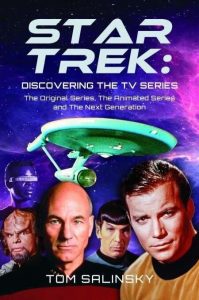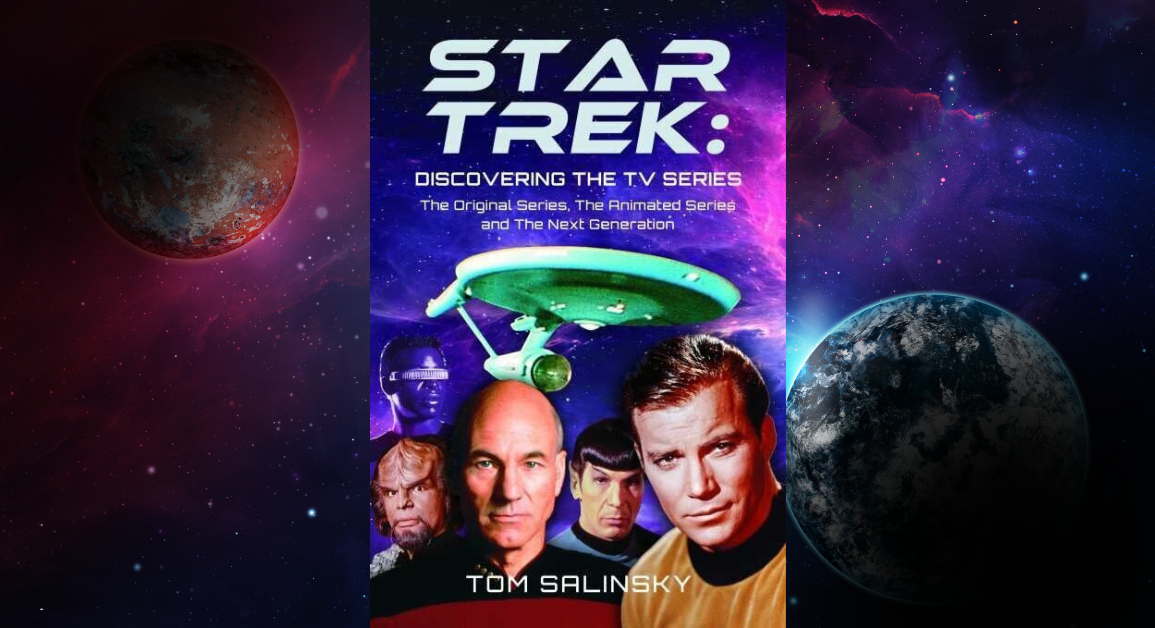Exploring the Final Frontier: A Journey Through “Star Trek: Discovering the TV Series” Book.
In the vast cosmos of science fiction, few franchises have captured the imaginations of audiences quite like Star Trek. For decades, it has served as a beacon of hope, exploration, and discovery, inspiring generations with its vision of a future where humanity reaches for the stars. Now, with the release of “Star Trek: Discovering the TV Series” book, fans old and new are invited to embark on a comprehensive journey through the iconic television series that started it all.

In ‘Star Trek: Discovering the TV Series’ lifelong science fiction fan, podcaster and author Tom Salinsky chronicles his two-year mission to watch everything from the start of The Original Series to the end of Enterprise. This book is the first part of that odyssey and includes reviews of every episode of The Original Series, The Animated Series and The Next Generation alongside contributions from notable fans, authors, actors, and broadcasters.
Tom has contributed this piece to Women Talking regarding his book:

Stereotypes are comforting things. If I have a box, I can fit you in, a label I can assign to you on first sight, I don’t have to bother with all that tiresome getting-to-know-you business and I won’t be discomfited if I learn things about you which don’t fit my preconceptions. The world is as it always is. But stereotypes are also hurtful, harmful, and dangerous, so we should learn to distrust them, not happily embrace them.
I’m a science fiction fan. I’m also a straight white man in my fifties who likes making lists and who has his own podcast. So, I fit the stereotype – right? Well, not only do I like science fiction and lists of things, in 2022 I set myself the task of watching Star Trek from the 1960s to the early 2000s, at the rate of one episode a day, a task calculated to take almost exactly two years. Don’t believe me? You can read all about my adventures in my new book, out now.
Bad storytelling deals in stereotypes. Lazy placeholders sit where we want rich, complex characters. Familiar archetypes mouth platitudinous clichés, and we either passively absorb it like moving wallpaper, or we get bored and watch something else instead. From the beginning Star Trek was bolder than that. It was the first science fiction television show to treat space and spaceships the way that cop shows treated the precinct, or law shows treated the courtroom – as a realistic place of work.
And representation mattered to creator Gene Roddenberry, who’d already earned a reputation as “difficult” because he wrote scripts which dealt with race and other social issues. He insisted that a Black woman be on the bridge of the Enterprise and twenty years later, Whoopi Goldberg inserted herself into the cast of a later iteration of the show because watching Nichelle Nichols on TV as a child had been such an eye-opening experience for her. And let’s not forget, that the show only got on the air because TV superstar Lucille Ball agreed to bankroll it.
That said, if you’re hoping that 1960s Star Trek is an early bastion of feminism, then you’ll likely be disappointed. Among some wonderful, imaginative storytelling which frequently offers a brilliantly progressive view of the future, time and again, female characters are reduced to barely-clothed mannequins who slink about the set while sultry saxophones wail. Sometimes it’s hard to believe that the male crewmembers of the Enterprise have ever even met a woman. Even Spock is not immune, falling for a vapid princess named Droxine in the drab third season story The Cloud Minders.
And yet, there are exceptions. Not just Lt Uhura, but fabulous Joan Collins playing 1930s radical thinker Edith Keeler, who spots Kirk’s deception in half a second flat. And Diana Muldaur as Miranda Jones, carefully concealing the secret of her blindness from everyone on board. Alas, these are exceptions, and the best stories tend to the ones centred on the men: Kirk, Spock, and McCoy.
Two decades later, Star Trek returned to TV with a brand-new cast and a brand new crew. Now instead of going “where no man had gone before”, the famous opening narration was subtly altered to the more inclusive “no one”. Possibly embarrassed at the sight of bridge officers in mini-skirts in the old series, here a few male extras can be seen in “skants” – uniforms which end in short dresses rather than trousers – but the idea didn’t catch on. The new line-up was six men and three women. One gets killed off half way through the first season, the other two are both in the “nurturing” roles of the Doctor and the ship’s Counsellor, and very few stories centre them. It isn’t really until we get to Deep Space Nine in the early 1990s that we get some female characters with the kind of depth and complexity that Patrick Stewart and Brent Spiner had been taking for granted.
Major Kira Nerys is a freedom fighter who now has to be diplomatic in her dealings with the butchers who murdered her friends. Oscar winning Louise Fletcher has a recurring role as religious leader Kai Winn whose loyalties are torn between her gods and her people. And we even get a little bit of LGBTQ representation with Terry Farrell as the symbiotic Dax, who has worn various bodies over the years, male and female, and whose former lover is surprised to see her where previously she had seen a him.
Sadly, even as late as 2004, we still get stories about scantily clad slave girls who need rescuing by brave men, courtesy of Star Trek: Enterprise, probably the least successful incarnation of the show. Star Trek’s vision of the future always tells us a great deal about the past it was created in, and some of those old ideas are very hard to shake off. But every time a Star Trek episode showed me something fresh, avoiding one of those old stereotypes, it was always cause for celebration.
Star Trek: Discovering the TV Series will be released on 30th March 2024. You can pre-order a copy from Amazon here
Poppy Watt


